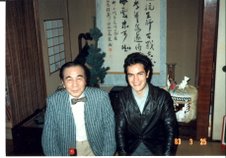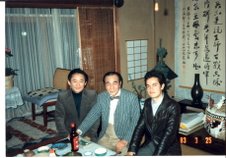James Wishart
Today's drive to Liverpool was not a conventional trip down memory lane, but a very special occasion: a send-off to James Wishart, who died last month.
James was a composer, lecturer, pianist, conductor and animateur. He taught music to generations of students who were fired up by his enthusiasm and knowledge, myself among them. He wrote music with a refined sense of colour, textural richness and tasteful pitch control. He played the piano with extraordinary character and ease. He promoted and programmed innovative events in his adoptive city of Liverpool, helping to define its character as a viable centre for new music.
The send-off took place at Springwood Crematorium. It was conceived and designed by two of James's closest friends, Stephen Pratt and Robin Hartwell. Endearing tributes by both of them were read as part of the programme. The whole event was conducted tastefully, lovingly and without superfluous sentimentality. It was all the stronger for that. I, for one, came out not so much with a lump in my throat as enveloped in the presence of that dear friend.
Below is the text of my contribution to the programme. I had been asked to focus on James's work as an instigator of student performances.
_________
My joyful first impression of James
Wishart – and my poignant last impression – were both marked by the same
prominent factor: the man’s physical presence.
On a cloudy day in October 1984 he
came to meet me, an arriving MMus student, at Lime Street Station – I did not
know at the time how unusual an act of kindness this was from a PG supervisor
in a British university. His imposing figure, standing next to the petite one
of the departmental secretary Molly Burns, offered a striking contrast to the
eye. Any inference that his considerable height and his not insignificant girth
might be those of a sluggish person was soon dispelled when James swiftly got
hold of my heaviest suitcase and with easy, almost graceful movements lifted it
and put it in the boot of Molly’s Ford Fiesta. The bulk and the agility seemed
at odds with each other. You could construct all kinds of metaphors around that.
To briefly fast-forward to my last
impression, I won’t dwell on the painfully visible effects of the two strokes,
except to say that the drastic loss of weight exposed something that previously
I had only been vaguely aware of: a set of surprisingly noble facial features
was now sharply delineated, making it hard to take your eyes off that face,
oddly familiar, oddly new, and always lit by the same two fiery, expressive
eyes which now conveyed so much of what he was unable to express verbally.
When it came to performing, James’s
physical persona took centre stage – literallly. His piano playing was gritty,
energetic and very precise. His conducting was focused, nimble and helpfully
detailed. He understood a score better than most, and his physical movements
were effective carriers of the character and gestural detail he saw in the
music he performed.
I played twice in James’s student
ensemble, Opus. I vividly remember the experience of playing his Icarus of 1983, conducted by him. This
was a richly textured and highly gestural piece, with a challenging vibraphone
part. At one rehearsal, one particularly angular and rhythmically complex
gesture was proving difficult to put together. One of the players asked how the
parts fitted together. James’s answer was a vocal rendition of the overall
gesture – a rapid-fire stream of sung notes, falsetto beeps, growls and
percussive onomatopoeia, producing such an unexpected torrent of sound that the
group erupted in roars of excited laughter. His comment was “Well, you did
ask”.
It may have been in the same
programme – was it? – that James let me conduct a new piece of mine, Meditación No. 1. It was his idea that I
should conduct it. The piano part was challenging, and of course he volunteered
to play it. To what extent it was his force, his characterful touch and his
rhythmic precision that kept the ensemble together I had occasion to assess
retrospectively a year later, when I conducted the same piece in London.
James was perfectly willing to
indulge more user-friendly tastes too. Towards the end of the academic year he
put together a staged performance of Weill’s and Brecht’s The Mahagonny Songspiel. He conducted us then, and he must have
been responsible for at least some of the overall production. James was equally
at home in the wry humour and smoky lyricism of this piece. A salient memory is
the opening, when a svelte female
student in a black body suit and net tights came on stage, cracked a
whip, approached the conductor, sinuously wrapped her leg around him and
stamped a kiss on his cheek. The conspicuous red lipstick mark on James’s cheek
seemed a fitting accessory for a trip into 1920s Germany.
-->
In my Liverpool afterlife, so to
speak, from my new base in London I engaged James to accompany the virtuoso
violinist Takeshi Kobayashi, whose visit to Britain I had negotiated with the
Japan Foundation. There were concerts in London and in Liverpool. The programme
included Fauré’s exuberant Sonata No. 1 for violin and piano, plus Takemitsu and a selection of other Japanese
contemporary music. A dizzy cocktail for any pianist, let alone one what was
also a full-time university lecturer. But James learned his parts and rose to
the level of the visiting virtuoso. Not for the first time, I was proud of him.
-->



